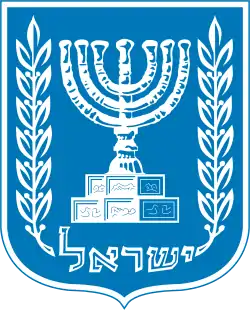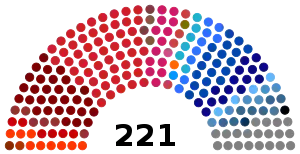1925 Assembly of Representatives election
Elections to the Assembly of Representatives were held in Mandatory Palestine on 6 December 1925, electing the legislature of the Yishuv. Around half the votes went to parties associated with trade unions.[1] Ahdut HaAvoda remained the largest party in the Assembly.
| ||||||||||||||||||||||||||||||||||||||||||||||||||||||||||||||||||||||||||||||||||||||||||||||||||||||||||||||||||||||||||||||||||||||||
221 seats in the Assembly of Representatives | ||||||||||||||||||||||||||||||||||||||||||||||||||||||||||||||||||||||||||||||||||||||||||||||||||||||||||||||||||||||||||||||||||||||||
|---|---|---|---|---|---|---|---|---|---|---|---|---|---|---|---|---|---|---|---|---|---|---|---|---|---|---|---|---|---|---|---|---|---|---|---|---|---|---|---|---|---|---|---|---|---|---|---|---|---|---|---|---|---|---|---|---|---|---|---|---|---|---|---|---|---|---|---|---|---|---|---|---|---|---|---|---|---|---|---|---|---|---|---|---|---|---|---|---|---|---|---|---|---|---|---|---|---|---|---|---|---|---|---|---|---|---|---|---|---|---|---|---|---|---|---|---|---|---|---|---|---|---|---|---|---|---|---|---|---|---|---|---|---|---|---|---|
This lists parties that won seats. See the complete results below. | ||||||||||||||||||||||||||||||||||||||||||||||||||||||||||||||||||||||||||||||||||||||||||||||||||||||||||||||||||||||||||||||||||||||||
 |
|---|
| This article is part of a series on the politics and government of Israel |
|
|
Electoral system
Following the 1920 elections, debate continued on the issue of women's suffrage.[2] In 1923 Mizrachi called for a men-only referendum on whether women should be entitled to vote, and threatened to withdraw from the Yishuv if one was not held.[2] The Jewish National Council agreed to hold one on 8 November 1925, but with female participation.[2] This led to Agudat Yisrael calling for a boycott.[2] In response, Mizrachi and the Jewish National Council agreed to cancel the referendum.[2]
The number of eligible voters rose from around 26,000 to 64,764.[3][4] However, turnout was only around 57%.[4] This was put down to an Agudat Yisrael boycott, several delays in holding the elections, and the unfamiliarity of some women with voting.[4]
Results
 | |||||
| Party | Votes | % | Seats | +/– | |
|---|---|---|---|---|---|
| Ahdut HaAvoda | 8,834 | 54 | –16 | ||
| Hapoel Hatzair | 5,337 | 30 | –11 | ||
| HaSephardim | 19 | –35 | |||
| Revisionists | 15 | New | |||
| Hebrew Women's Association | 13 | New | |||
| Agricultural Bloc | 9 | New | |||
| Democrat's Association | 9 | New | |||
| Mizrachi | 7 | –2 | |||
| Centre List | 6 | New | |||
| National Citizens | 6 | New | |||
| Ma'amad Hapoalim | 1,028 | 6 | New | ||
| Hapoel HaMizrachi | 6 | New | |||
| Hapoel HaMizrachi HaMeuhad | 4 | New | |||
| Polish Immigrants List | 4 | New | |||
| Valley Kibbutzim List | 2 | New | |||
| Safed Municipality List | 2 | New | |||
| HaMerkaz HaHakla'i | 1 | New | |||
| Galilee Farmers Association | 1 | New | |||
| Eastern Farmers Association | 1 | New | |||
| Georgian's List | 1 | New | |||
| Hebrew Women's Popular list | 1 | New | |||
| Givat HaRambam list | 1 | New | |||
| Young Mizrachi List | 1 | –1 | |||
| Craftsmen's Centre | 1 | –5 | |||
| Bnei Brak Residents' List | 1 | New | |||
| Others | 20 | – | |||
| Total | 35,987 | 100 | 221 | –93 | |
| Registered voters/turnout | 64,764 | – | – | ||
| Source: Mackie & Rose[5] | |||||
References
- "Palestine Parties" The Times, 18 December 1925, p13, Issue 44148
- Zalman Abramov (1976) Perpetual dilemma: Jewish religion in the Jewish State Fairleigh Dickinson Univ Press, p108
- Abramov, p90
- Abramov, p109
- Thomas T Mackie & Richard Rose (1991) The International Almanac of Electoral History, Macmillan, p243 (vote figures)